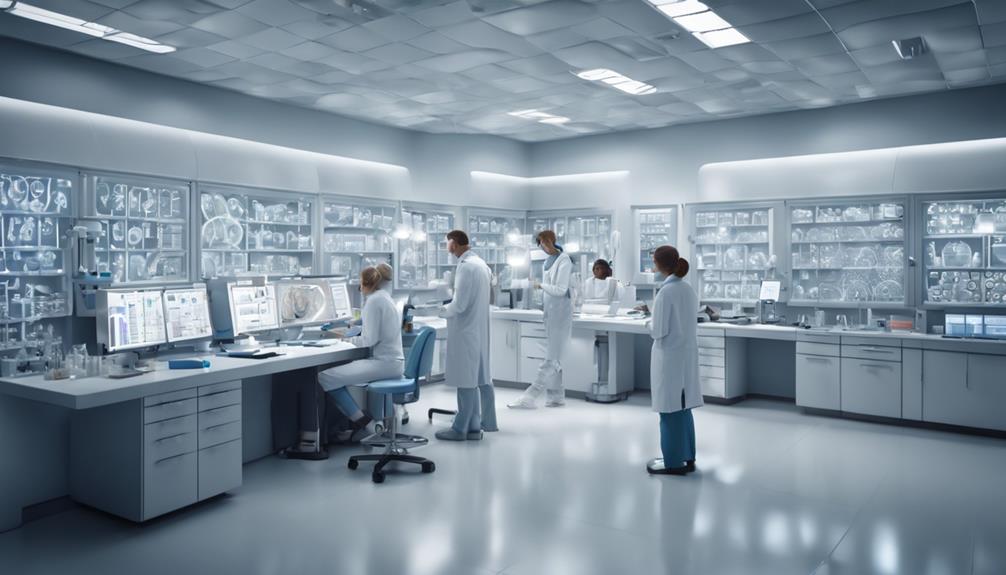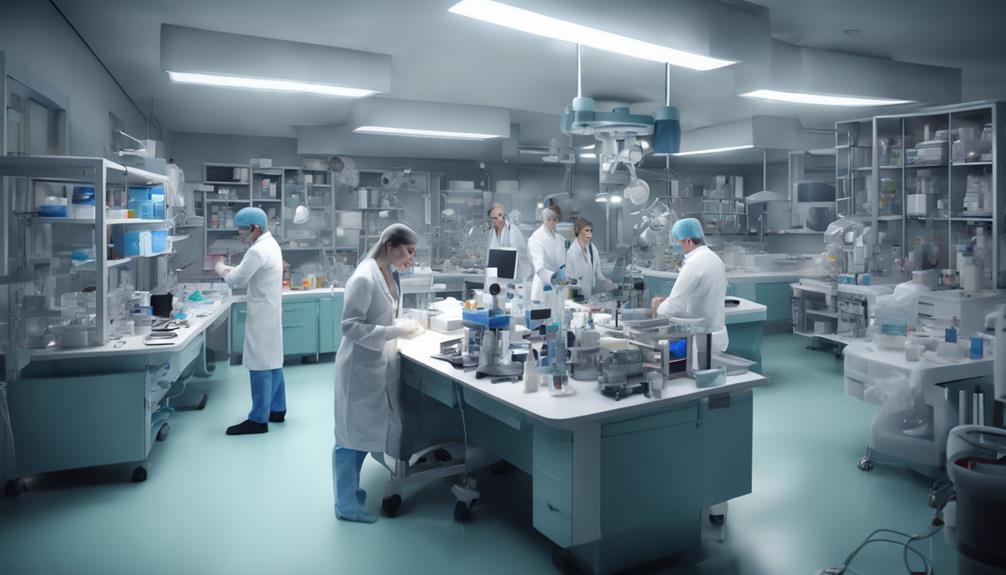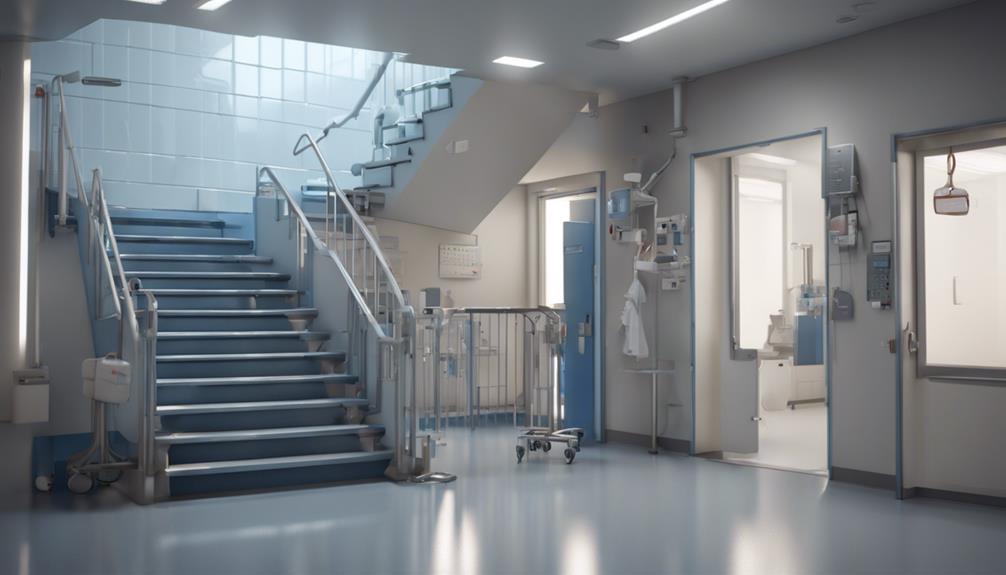
Yes, being a medical technologist can be difficult. You'll need a bachelor's degree in medical technology or a related field, which typically involves four years of intensive study in areas like microbiology and chemistry. After graduation, you must pass a rigorous certification exam and keep up with continuing education to maintain your certification. Daily, you'll handle complex lab equipment and analyze critical patient samples, requiring precision and accuracy under often stressful conditions. It's a role that demands both technical skill and emotional resilience. But every day you'll play a vital part in diagnosing and treating patients, which adds a layer of satisfaction and continuous learning to your career.
Educational Requirements

To become a medical technologist, you'll need to earn a bachelor's degree in medical technology or a related field. This typically involves a four-year program that covers a mix of biology, chemistry, and clinical laboratory skills. You'll dive into courses like microbiology, hematology, and immunology, which are crucial for your future role in diagnosing diseases and managing lab equipment.
During your studies, you'll also tackle general education subjects, which enhance your critical thinking and communication skills—both vital when you're interpreting complex lab results or collaborating with healthcare professionals. It's not just about learning what's in your textbook; you have to understand how to apply this knowledge practically.
Your chosen university may offer specific tracks tailored to different aspects of medical technology. These can offer a deeper focus on areas like molecular diagnostics or clinical chemistry. Choosing a specialization can make you more attractive to potential employers and may influence your career trajectory.
Training and Certification
After earning your degree, you'll need to complete specific training and obtain certification to work as a medical technologist. Depending on where you live, the certification process can vary, but it generally involves passing a rigorous exam that tests your knowledge and skills in the field.
You'll likely need to apply for certification through a recognized body such as the American Society for Clinical Pathology (ASCP) or the American Medical Technologists (AMT). These organizations offer the credentials necessary to prove your competence.
Preparing for these certification exams usually requires a combination of theoretical knowledge and practical experience, which you'd have begun to acquire during your degree program.
The training doesn't stop once you've passed your certification exams. To maintain your certification, you'll need to complete continuing education courses throughout your career. This ensures you stay up-to-date with the latest advancements and technologies in medical technology.
Technical Skill Development

Once you've passed your certification exams, developing your technical skills becomes your next focus as a medical technologist. You're entering a field where precision and accuracy are paramount, and your ability to handle complex equipment and conduct tests effectively is crucial.
You'll need to become proficient in using advanced lab equipment, from spectrophotometers to centrifuges. Each piece of equipment requires specific knowledge and hands-on competence that you'll develop through practice and continual learning.
It's not just about following a procedure; it's about understanding why each step in the procedure is necessary and how different variables can affect your results.
You'll also work on refining your analytical skills. Being able to interpret test results accurately is key. This involves not just a thorough understanding of biological and chemical principles, but also an ability to notice patterns or discrepancies that could indicate a need for further testing.
Daily Responsibilities
As a medical technologist, you'll manage a variety of tasks each day that ensure the lab operates smoothly and efficiently. You're responsible for analyzing body fluids and cells, identifying bacteria and viruses, and conducting blood tests. This work is critical, as you provide the data needed for diagnosing and treating patients.
You'll also calibrate and maintain the lab equipment. It's your job to ensure that all machines are operating correctly, which involves routine checks and troubleshooting any issues that arise. Accuracy here is key; even a small error can lead to incorrect test results.
On top of these tasks, you'll prepare samples for analysis, using your expertise to decide the appropriate techniques for testing. Following strict procedural protocols, you're expected to document every step of the processes you perform. This meticulous record-keeping isn't just bureaucratic; it's essential for tracking patient outcomes and maintaining the integrity of medical research.
Each day, you'll collaborate with other healthcare professionals, discussing lab results and their implications for patient care. Despite the pressure, your role is indispensable in the healthcare system, providing vital information that shapes patient treatment plans.
Workplace Environment Challenges

Working as a medical technologist, you'll face several challenges in your workplace environment, ranging from high stress levels to potential safety hazards. You're often on your feet for long hours, which can lead to physical exhaustion. You'll need to maneuver around tight, crowded labs and handle delicate equipment, which requires both precision and caution.
You'll also work with infectious specimens and hazardous chemicals, making proper safety protocols your top priority. It's crucial you're up-to-date with your facility's guidelines and always wear the appropriate personal protective equipment. Any lapse in these protocols can lead to serious health risks.
Moreover, the pressure to deliver accurate results quickly is constant. You're aware that a single error could have significant repercussions for patient care. This demand for speed and accuracy can make your job quite stressful.
You'll find that your role requires you to adapt quickly to new technologies and procedures. The medical field is always evolving, and keeping pace can be both challenging and exciting. Staying informed through continuous education is key, but it's another demand on your already full plate.
Navigating these challenges is tough, but it's also what makes your work crucial and rewarding.
Emotional and Mental Demands
You'll frequently encounter significant emotional and mental demands in your role as a medical technologist. Each day, you're tasked with processing and analyzing critical medical tests that can determine someone's diagnosis, prognosis, and treatment plan. The pressure to deliver accurate results quickly is intense, and mistakes can have serious consequences. You're constantly reminded that behind every sample lies a patient's well-being, adding an emotional weight to your technical responsibilities.
Moreover, the nature of your work can often be isolating. You spend hours in a laboratory, sometimes with minimal interaction with colleagues. This can lead to feelings of detachment and stress, particularly if you're a social person who thrives on direct human contact. It's essential to find ways to connect with your peers and maintain a support network, even within the confines of a busy lab environment.
Handling these pressures requires a robust mental resilience. You'll need to develop coping mechanisms to manage stress effectively. Whether it's through professional support networks, mindfulness practices, or regular physical activity, maintaining your mental health is as crucial as your professional competence.
Career Advancement Opportunities

Career advancement opportunities for medical technologists are both varied and rewarding. You'll find that with the right mix of experience, education, and initiative, you can move up into higher-paying and more specialized roles. Initially, you might start as a generalist in a hospital lab, but with time, you can specialize in areas like microbiology or clinical chemistry.
If you're interested in management, positions such as a lab manager or a clinical supervisor could be in your future. These roles require strong organizational skills and a deep understanding of lab operations, but they also offer a chance to lead a team and influence lab practices and policies.
Moreover, some techs choose to move into the commercial side of healthcare. You could work in sales, marketing, or support for laboratory equipment and reagents. This path offers exposure to the business aspects of healthcare and can be quite lucrative.
Additionally, continuing education can open doors to teaching positions in medical technology programs or even to roles in research and development. Whatever path you choose, your ability to advance will depend on your commitment to continuous learning and professional development.
Always keep an eye on how you can grow your skills and advance your career.
Balancing Work and Life
Balancing the demands of your job with your personal life can be challenging as a medical technologist. You're often caught in a whirlwind of long shifts, on-call duties, and the relentless pace of laboratory work. It's easy to see how your work life can start creeping into your personal time, leaving you feeling like you're always on the clock.
To maintain a healthy work-life balance, you've got to set firm boundaries and stick to them. Decide when you'll stop taking work calls or checking emails at home. It's also crucial to communicate openly with your supervisor about your workload. Don't shy away from discussing the impact of overtime or irregular hours on your well-being.
Make sure you carve out time for yourself too. Whether it's pursuing a hobby, exercising, or simply unwinding with family and friends, these activities can significantly reduce stress and rejuvenate your spirit.
Remember, taking time off isn't just a luxury; it's necessary to sustain your productivity and enthusiasm for your role.
Ultimately, finding balance isn't about sacrificing your career ambitions but ensuring you don't lose sight of what makes life enjoyable and fulfilling outside of work.
Frequently Asked Questions
What Are Common Misconceptions About Medical Technologists?
You might think medical technologists just run tests, but they're critical in diagnosing diseases, ensuring accuracy, and often multitask under pressure, contrary to the belief that their work is straightforward and repetitive.
How Has Technology Impacted the Role of Medical Technologists?
Technology's transformed your role, automating routine tasks and enhancing diagnostic precision. You now focus more on complex analysis and integrating tech advancements, which improves patient outcomes and streamlines healthcare processes.
What Are Typical Salary Ranges for Medical Technologists?
You're looking at typical salary ranges for medical technologists, which generally fall between $50,000 and $70,000. However, this can vary based on location, experience, and specific area of expertise within the field.
How Do Medical Technologists Interact With Patients?
As a medical technologist, you'll often interact with patients by collecting samples, explaining test procedures, and sometimes discussing results. Your role is crucial in ensuring they feel comfortable and informed during their visit.
What Are the Retirement Options for Medical Technologists?
As a medical technologist, you'll find various retirement options, including 401(k) plans, pensions, and IRAs. It's essential to start planning early to ensure you're set for your retirement years.
Conclusion
As a medical technologist, you'll face a steep learning curve with rigorous education and certification requirements. Developing your technical skills is just the beginning.
Every day brings complex responsibilities and emotional demands, within challenging workplace environments. However, the opportunities for career advancement can be rewarding.
Balancing work and life is crucial to avoid burnout. Embrace the challenges and remember, your role is vital in saving lives, making all the hard work worth the effort.






